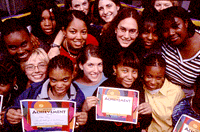Civic Lessons
The Pennsylvania Gazette
September 1999
The spirit of college houses extends beyond the walls of student residences at Penn to include two student-initiated, non-residential communities, or hubs, situated in their midst: Civic House and Kelly Writers House.
The Writers House has evolved over the past four years into an active gathering place for aspiring and professional wordsmiths of all kinds, hosting readings, workshops and classes. Civic House, starting its second year this fall, also serves a broad range of constituents, from campus groups and neighborhood organizations to academic courses designed around service learning. In addition to providing office, meeting and classroom space, notes its director, David Grossman, the building itself located at 3914 Locust Walk functions "as a kind of community living room."

-
Girl Talk mentors and pals at Civic House
The Pennsylvania Gazette
The house also provides a great training ground for tomorrow's leaders, says Dr. Peter Conn, the deputy provost who has served as its faculty adviser. "At Civic House students find support as they attempt to engage in meaningful opportunities for community service, but they are also encouraged to reflect on those experiences in systematic ways. In other words, at its best, Civic House combines service projects with opportunities for inquiry, in which difficult questions can be addressed, such as: What is the connection between service and the curriculum? What is the role of the University in the community? Why am I doing this? And so on."
Its connections with the college houses are still evolving, Grossman says. Last year, "with Civic House and the college houses both ramping up so quickly, we relied, I think on some core traditional relationships, where they would ask us for help in organizing a project, and we would identify a project for them and help them think it through." For some houses, it was a one-time activity; others adopted projects for the school year.
But the potential for future collaboration, he believes, is enormous. "It can be a bonding activity for a hall. I've seen it bring students together from different social, economic and racial backgrounds, from different majors and from different schools on campus, because they're doing something in common that has more meaning to it, in some respects, or different meaning, than an ice cream social."
Civic House is especially eager to reach freshmen and sophomores, adds Conn. "By the time they are juniors and seniors, they can be leaders training the next generation who will replace them."
